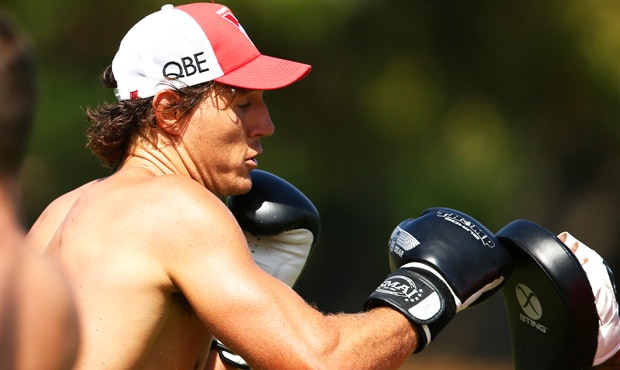IT APPEARS the AFL Commission will spend Christmas pondering whether the Sydney Swans should be allowed to trade again after hearing club officials argue their case on Monday.
On the surface it appears the only way to soften the Swans' trading ban might be to cut it in half, given that one half of the two-year ban has already passed.
Anything else but ending it now would be doubling down on a 'penalty' many struggle to comprehend because the Swans broke no rules.
Worse, the industry is now recognising the decision – which was never fully explained although it clearly related to negotiations surrounding the phasing out of the club's cost of living allowance (COLA) – has some unintended consequences.
The decision not only locked out players but it locked some in too, giving the Swans less capacity to recalibrate their list and denying players potential opportunities to come and go.
The Swans have reacted professionally but their frustration is understandable, particularly given COLA was a rule the AFL introduced and the Swans implemented.
Swans argue their case against AFL Commission
Although the club’s recruiting of Lance Franklin and Kurt Tippett at the end of 2013 and 2012 respectively created a furore (particularly when it signed Franklin for nine years) it was easier to identify the players it lost to create room for those additions than compute how COLA had made it possible.
Let's face it, the main way the Swans’ strategy differed from what Hawthorn (who have recruited Brian Lake, Ben McEvoy, Josh Gibson, Shaun Burgoyne, Jack Gunston and James Frawley) or Geelong (Jared Rivers, Josh Caddy, Hamish McIntosh, Mitch Clark) have done in recent times was that the players it recruited were at the absolute top of their game.
However, as equalisation discussions heated up, the club’s decisions received much more attention from the football community, media and in the end, the AFL Commission.
Presumably rumours the Swans might be interested in Patrick Ryder or Frawley during this trade period (claims denied by the Swans) would not have helped the Commission's disposition because anything less than a restrained Swans' recruiting strategy at the end of 2014 would have thrown fuel on an already emotional debate.
To be fair, the AFL has admitted it needed to use a blunt instrument such as a ban to remove anomalies from the draft and salary cap system as quickly as possible and the Swans copped the full force.
Even with the blow, the Sydney Swans should be able to ride out some pain initially with the introduction of young talent.
But if they have to wait until 2016 to re-enter the trading market, they could explode like a boiling pot once they are re-admitted.
Remember if the ban remains, the trading masters will re-enter the fray immediately after a new broadcast deal is signed and a CBA is agreed upon, one that will possibly increase the salary cap further.
A bullish and motivated Sydney Swans would be a dangerous opponent on the trading room floor.
Even without COLA the club could expect to free up some cap space with Adam Goodes and Rhyce Shaw presumably retired, Ted Richards, Mike Pyke, Ben McGlynn and Jarrad McVeigh entering their twilight years and a couple of list-cloggers it can release.
That's in addition to the departures in recent seasons.
Kurt Tippett gets stuck into pre-season training in Sydney earlier this month. Picture: Getty Images
Of course, getting a handle on the Swans' salary cap is difficult, with ‘Buddy’ reported to be entering the $1.2-million-a-year phase of his contract in 2016 that climbs to $1.4 million in his final season, but given they have already lost 1288 games experience from their 2012 premiership tea, they will have some wriggle room.
The Swans are an attractive club for players and they won't struggle to attract stars of the game even without COLA (it retains a fixed accommodation subsidy for its lower paid players after the allowance is phased out).
Make no mistake though, missing one year has had an impact.
The club missed a chance to bid for wantaway Lion Joel Patfull, which will potentially force it to play players out of position or in defence before their time this season.
AFL.com.au also understands it's also struggled to re-negotiate some deals with good performers from 2014 as it normally would as it awaits a decision on whether the ban will be softened.
And recent history suggests missing out on recruiting players for two consecutive seasons is not conducive to winning flags.
Next year will be different already.
The Swans will likely face a revised Academy and father-son bidding system that will see them asked to pay more in real terms for Callum Mills and Josh Dunkley than they did for Isaac Heeney.
The club is likely to face a more competitive Greater Western Sydney who will still have its initial TPP allowance to play with.
And it will be relying on two venerated tall backmen and a weakened ruck division to negotiate its way through 2015.
The decision seems clear now that the emotion has died down and the Swans have had their chance to put their case to the AFL Commission.
Get the Swans back into the game as the cost of living allowance is being phased out and allow them to make the same mistakes as 17 other clubs.
And give a club that has won two premierships in 10, or 81 years depending on your perspective, a chance to add to its record.
Otherwise – even with COLA gone and its total player payments facing the same constraints as other clubs – it's possible the second wave of Swans' recruiting might be more powerful than the first.
And who knows what the reaction will be then?


